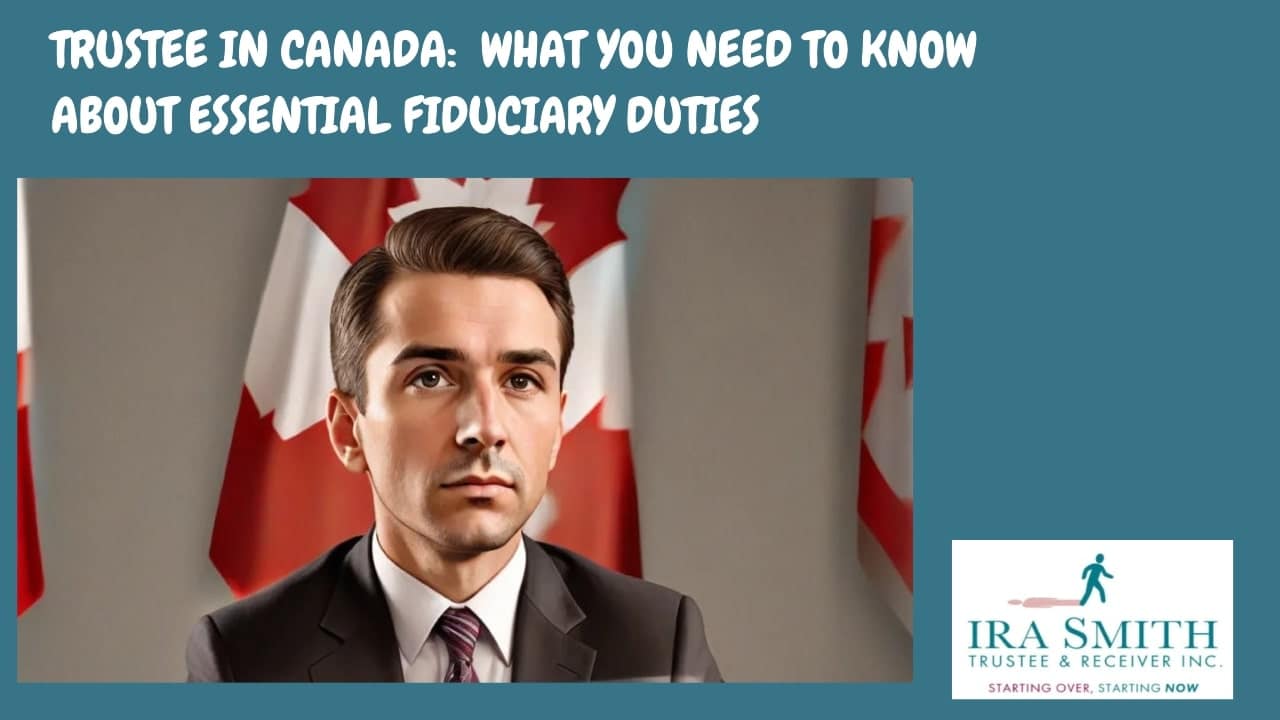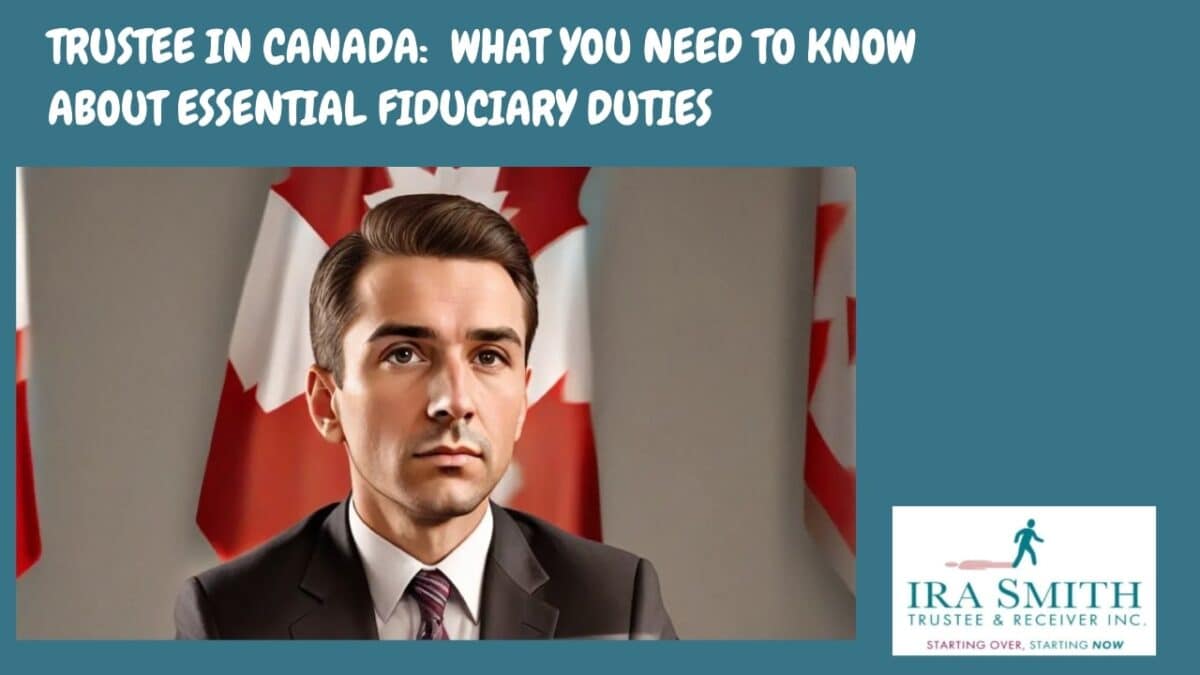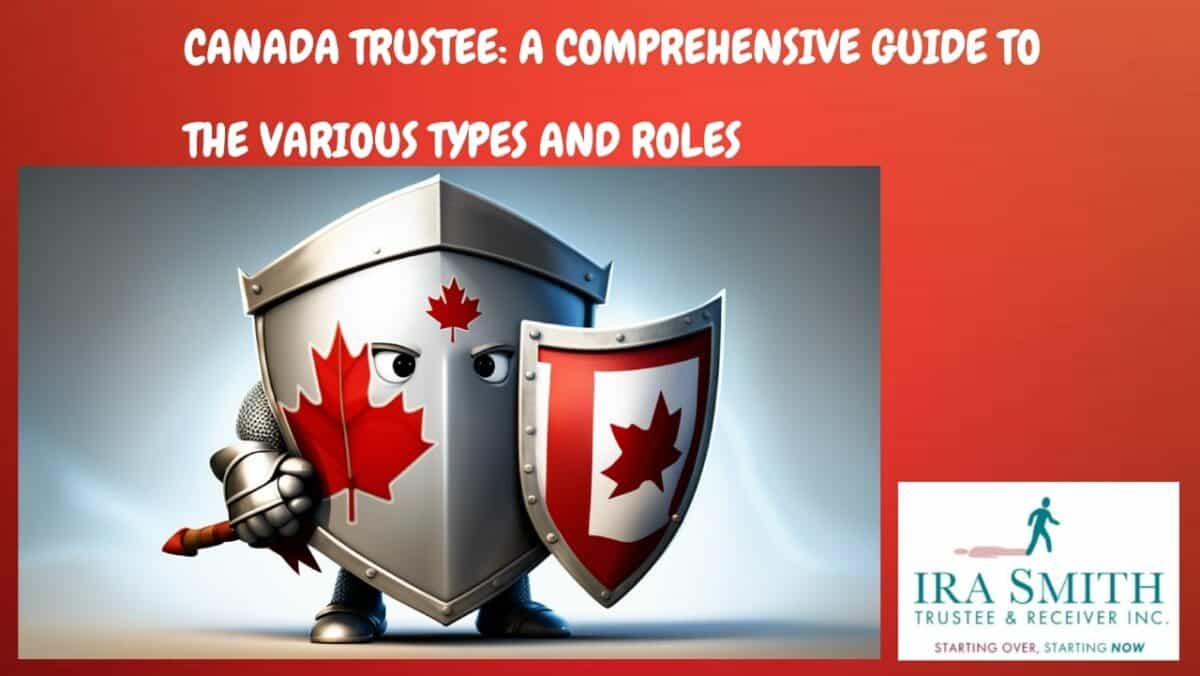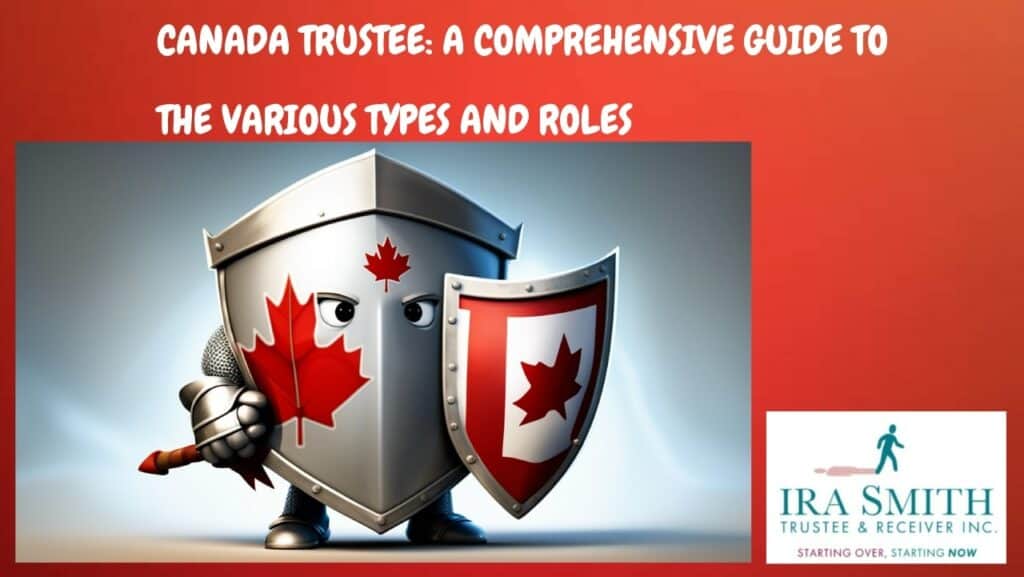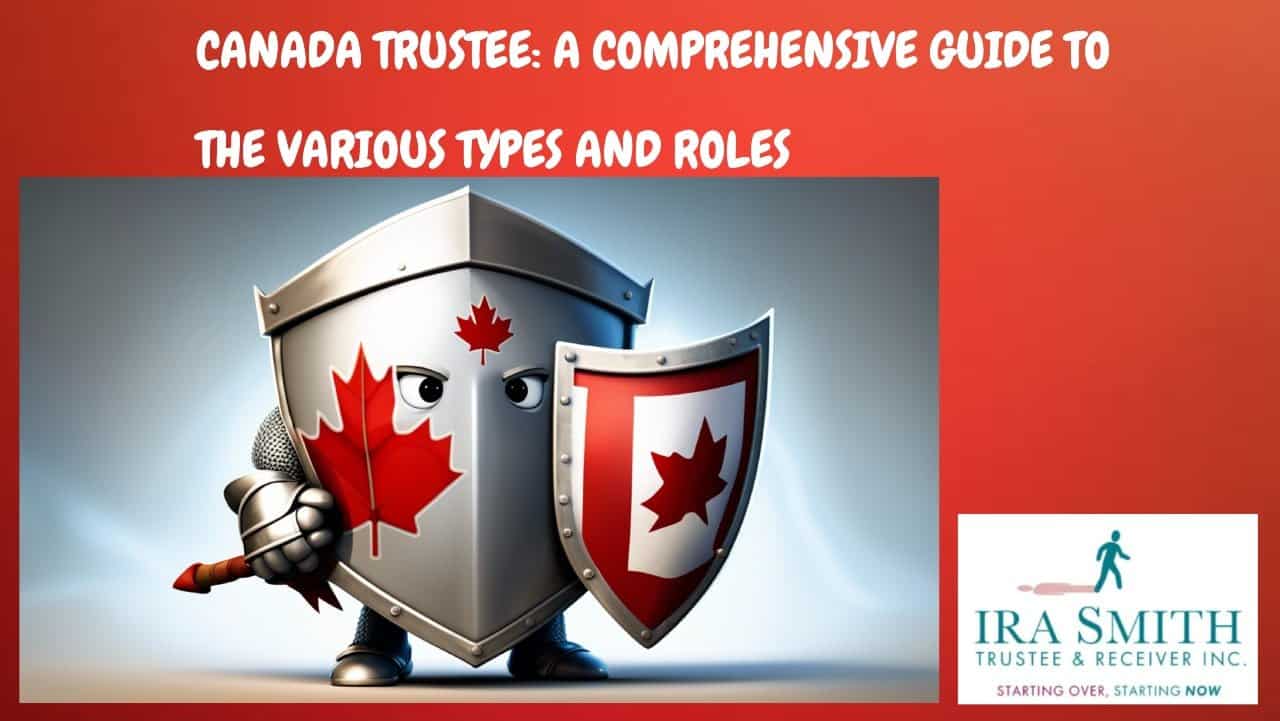What is a Trustee in Canada?
Trusts might seem a little confusing, but they’re super important when it comes to managing assets and making sure your wishes are respected. Whether you’re involved with a trustee in Canada as a settlor, a beneficiary, or especially as the trustee, it’s really important to know what your responsibilities are. In this blog post, we’ll break down the key duties of a trustee in Canada to help you better understand this crucial role.
A trustee in Canada is a person or company responsible for managing and overseeing assets in a trust for the benefit of the people named as beneficiaries. Trustees have legal ownership of the trust’s property and are empowered and obligated to manage, use, or sell these assets according to the trust’s terms and Canadian law.
A trustee in Canada can be appointed in different ways. You might be named in a will, creating what’s called a testamentary trust, in which case the trustee is known as the Estate Trustee. Alternatively, a trustee could be chosen through a separate trust document or even by law (like a licensed insolvency trustee) or by a court decision.
If you’re serving as a professional trustee in Canada, it’s important to fully understand your fiduciary duties in administering estates. A trustee must always act in the best interests of the beneficiaries—not for personal gain.
In this Brandon’s blog, we’ll explain the essential fiduciary duties of a trustee in Canada to help guide you through the responsibilities that come with this important role.
Fiduciary Duties of a Trustee in Canada
The idea of fiduciary duty is at the heart of a trustee in Canada’s role. Essentially, a fiduciary is someone who must put the interests of others before their own. For a trustee in Canada, this means being honest, careful, and acting in good faith. Here are the main fiduciary duties a trustee must follow in Canada:
Duty of Loyalty
The duty of loyalty is huge for any trustee in Canada. This means that trustees must:
- Act only in the best interests of the beneficiaries.
- Avoid any conflicts of interest.
- Not benefit personally from their role as a trustee.
This duty is enforced by the Trustee Act and Canadian law. For example, a trustee can’t use trust funds to make personal investments that would benefit them over the beneficiaries.
Duty of Care
A trustee in Canada has to manage the trust assets carefully. They must show the same level of care, skill, and judgment that a responsible investor would. This means:
- Managing trust assets responsibly.
- Making informed decisions based on common sense and good judgment.
Duty to Act Personally
A trustee in Canada can delegate some tasks, but they can’t delegate everything. A trustee is personally responsible for all decisions they make, and they are held accountable for the actions of anyone they hire. If they don’t properly supervise someone they hire, they could be held liable.
Duty to Act Personally
Also called the “even-handedness” rule, this duty means a trustee in Canada must treat all beneficiaries fairly. Trustees can’t give special treatment to one beneficiary over another unless the trust document specifically allows it.
Duty to Avoid Conflicts of Interest
A trustee in Canada must avoid any situations where their personal interests could conflict with the interests of the beneficiaries. For example, a trustee shouldn’t buy property from the trust or invest the trust’s money in a business they own. Trustees must keep trust assets separate from their own assets and remain neutral.
The Duty to Maintain an Even Hand
A trustee in Canada must balance the interests of all beneficiaries, even if they have different needs. For example, if one beneficiary has a life interest in an asset and another will inherit the remaining value after their death, the trustee still has to manage things fairly between them. The trustee in Canada can’t favour one beneficiary over another unless specified by the trust.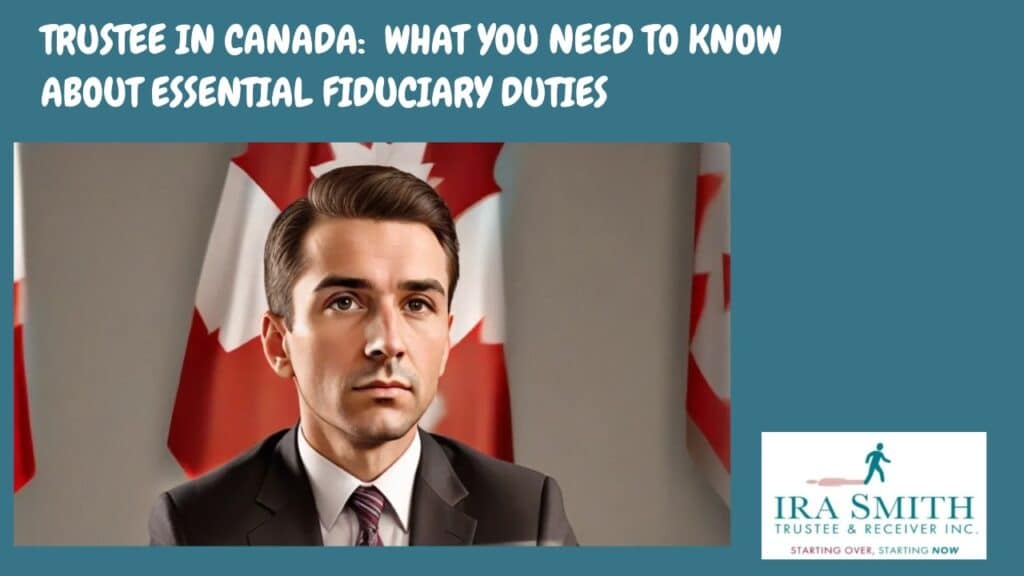
Understanding the Role of a Licensed Insolvency Trustee in Canada
What is a Licensed Insolvency Trustee in Canada?
A Licensed Insolvency Trustee in Canada (LIT) (formerly called bankruptcy trustees) is a professional who specializes in managing debt and insolvency issues for individuals and businesses with debt problems. We are licensed by the Government of Canada, which means we have undergone rigorous training and testing. This ensures we are equipped to help individuals and companies navigate the complexities of debt management, financial restructuring and debt bankruptcy.
LIT Qualifications and Process
- Education: LITs must complete extensive educational requirements.
- Examination: They must pass a series of comprehensive written and oral exams.
- Ethical Standards: LITs adhere to strict ethical guidelines.
These qualifications allow LITs to offer sound financial advice and effectively manage insolvency proceedings. They are not just financial advisors; they are experts in their field.
Key Responsibilities in Debt Management
So, what exactly do LITs do? Here are their key responsibilities:
- Managing Insolvency Processes: We oversee the legal and financial aspects of formal restructuring plans, bankruptcy and consumer proposals.
- Providing Financial Advice: LITs offer tailored advice based on individual financial situations.
- Representing Creditors: Depending on the role, be it a receiver, administrator in respect of a Bankruptcy and Insolvency Act (BIA) Proposal, Monitor under a CCAA Plan of Arrangement, or the Trustee in a bankruptcy, the LIT may represent the secured creditor, the debtor, the unsecured creditors or be the neutral independent officer of the court in dealings with all stakeholders and the court.
In essence, we act as a bridge between the debtor and the creditors, ensuring that everyone’s rights are protected.
Differences Between LITs and Traditional Financial Advisors
While both LITs and traditional financial advisors offer financial guidance, they serve different purposes. Traditional advisors may help with investments and savings. In contrast, LITs specialize in debt relief and insolvency. They have the expertise to handle complex situations that regular advisors may not be equipped to manage.
“A seasoned Licensed Trustee can provide solutions that individuals simply can’t identify on their own.” – Financial Expert
In tough financial times, having a licensed professional can make all the difference. They help ensure that you’re not alone in navigating these challenges. If you find yourself overwhelmed by debt, consider reaching out to a Licensed Trustee for support and guidance.
Trustee in Canada: Exploring Debt Relief Options
When it comes to managing debt, we often feel overwhelmed. It’s crucial to understand our options. After all, “Understanding your options is the first step towards financial recovery.” – Certified Financial Planner.
The Ins and Outs of Bankruptcy and Insolvency
Bankruptcy is a legal process designed to help individuals or businesses eliminate or restructure their debts. It offers immediate relief from creditor actions, allowing you to breathe a little easier. But it comes with its own set of challenges for personal bankruptcy.
- Pros: You can discharge most unsecured debts and get a fresh financial start.
- Cons: It can impact your credit score significantly, and you may lose some assets.
The insolvency world is complex, so it’s essential to get professional advice.
Benefits and Downsides of Consumer Proposals
Consumer proposals are a bankruptcy alternative. They allow you to negotiate a repayment plan with your creditors. With a consumer proposal, the interest clock stops, you pay a fraction of what you owe (like 25%) and you get extended repayment terms.
- Pros: You can keep your assets and avoid the stigma of bankruptcy.
- Cons: Your credit score may still be affected, depending on the terms of the proposal.
For many, this option feels more manageable. It’s a structured way to tackle debt without losing everything. If you owe more than $250,000, not including any mortgage registered against your principal residence, then you can use commercial proposal proceedings under the BIA, rather than a consumer proposal.
Why Debt Management Plans Might Be the Right Solution
Debt management plans are agreements between you and your creditors. They often involve lower interest rates and more manageable repayment schedules. These plans are usually facilitated by not-for-profit credit counselling agencies.
In essence, they can provide a lifeline without the need for formal insolvency processes. They help you regain control over your finances.
Each of these debt relief options has its advantages and implications. Choosing the right one can make a significant difference in your financial future.
The Advantages of Partnering with Canada Trustees
When financial troubles arise, the road ahead can seem daunting. But what if I told you that partnering with a Canada Trustee can make all the difference? Here are some compelling reasons to consider this professional support.
1. Personalized Financial Strategies
One of the most significant benefits of working with a Canada Trustee is the personalized financial strategies they provide. Every financial situation is unique.Canada Trustees assess your specific circumstances—your income, debts, and goals. From there, they craft a tailored plan that addresses your needs. Isn’t it comforting to know you’re not just another case number?
2. Protection from Aggressive Creditor Actions
Debt collectors can be relentless. They often resort to aggressive tactics that can leave you feeling overwhelmed. This is where a LIT steps in. They act as a buffer between you and your creditors. With a licensed trustee, you gain protection from aggressive creditor actions. This means no more phone calls or threats. You can focus on resolving your financial issues without the constant stress of harassment.
3. Stress Reduction and Support
Dealing with financial issues isn’t just about numbers; it’s about emotions, too. The weight of debt can be heavy. However, having a LIT by your side provides stress reduction and support throughout the process. They guide you every step of the way, offering reassurance and expertise. The peace of mind that comes from having an expert on your side can’t be underestimated. That peace is invaluable.
4. Proven Success Rates
Did you know that LITs successfully manage insolvency cases? This reflects strategic planning and expert negotiation. When you work with a LIT, you’re not just hoping for the best; you’re employing a proven approach to regain control of your finances.
Partnering with a LIT offers indispensable support. It alleviates immediate financial stress and lays the groundwork for future stability. If you’re facing financial challenges, consider reaching out to a Licensed Trustee in Canada. Your future self will thank you.
Choosing the Right Licensed Insolvency Trustee for Your Needs
When you’re facing financial troubles, finding the right Licensed Trustee in Canada can feel daunting. It’s crucial to select someone who you feel you can work with and who “gets you”. The right LIT can be a significant ally in your journey to financial recovery. So, how do you choose the one that fits your needs?
Tips for Finding The Right Separate Trustee in Canada For You
First things first, start with a bit of research. Personal referrals can be incredibly valuable. Ask friends or family if they or anyone they trust has had positive experiences with a Licensed Trustee in Canada. Online reviews also provide insight into a LIT’s reputation and reliability.
- Check Credentials: Ensure they are licensed and regulated by the appropriate authorities.
- Experience Matters: Look for someone with a proven track record in handling cases similar to yours.
Important Questions to Ask During Consultations
Once you narrow down your options, it’s time to consult. Prepare a list of questions. This will help you gauge their expertise and approach. For instance:
- What is your experience with my type of financial issue?
- How do you charge for your services?
- What is your approach to debt relief?
A knowledgeable LIT will provide clear answers, demonstrating a commitment to your financial recovery.
Assessing Fees and Services Offered
Transparency in fees should be non-negotiable. Ask for a breakdown of costs and ensure there are no hidden charges. Some LITs may offer a free initial consultation, which can be a good opportunity to assess their services and approach.
In conclusion, identifying the right LIT requires thorough research. Their qualifications should align with your specific needs and financial situation. If you are struggling with debt, remember that the right LIT can make a significant difference in achieving financial stability. Don’t hesitate to reach out and explore your options for a brighter financial future.
Trustee Accountability in Canada
Being a trustee in Canada means being accountable for your actions. This includes:
Record Keeping and Reporting
A trustee in Canada must:
- Keep detailed records of all the trust’s assets and how they’re managed.
- Be ready to show these records to beneficiaries when asked.
- Regularly update beneficiaries on the trust’s status.
Investment Responsibilities
When it comes to investing trust funds, a trustee in Canada must:
- Only invest in approved assets.
- Treat all beneficiaries fairly.
- Avoid risky or speculative investments.
Legal Consequences of Breaching Fiduciary Duties
If a trustee in Canada breaks their fiduciary duties, they could be held personally liable for any losses that happen because of it. Even though the standard is not about being perfect, trustees are expected to act honestly and in good faith.
Best Practices for a Trustee in Canada
To be an effective trustee in Canada, follow these best practices:
- Get familiar with the trust document and its terms.
- Seek professional advice when necessary, especially for complicated financial, tax or legal issues.
- Keep clear and accurate records of all activities related to the trust.
- Communicate openly and regularly with beneficiaries.
- Stay updated on changes in trust law and investment strategies.

FAQ: Understanding the Role of a Trustee in Canada, Personal Representatives, and Guardians
What is the key difference between a personal representative, a trustee in Canada, and a guardian?
A personal representative (or executor) handles the tasks necessary under the will of a deceased person, like managing the estate’s assets, the payment of money for the payment of debts of the estate and making the required distribution of estate assets. Their role is temporary, ending once the estate is settled.
A trustee in Canada, however, manages assets held in a trust according to the trust document. Their job can last much longer, especially if the trust supports a minor, someone with special needs, or provides ongoing income. A guardian takes care of someone who can’t care for themselves, like unborn persons, a child, an incapacitated adult or any other incapable person or incompetent person. The role and duties of a LIT are discussed above.
What are the primary duties of a trustee in Canada when managing a trust?
A trustee in Canada must:
- Act in the best interests of the beneficiaries.
- Manage and invest trust assets responsibly.
- Avoid conflicts of interest and personal gain.
- Keep clear records and provide regular reports to beneficiaries.
- Treat all beneficiaries fairly.
How can a trustee in Canada be removed?
A trustee can be removed if they aren’t doing their job properly, have a conflict of interest, or are acting irresponsibly. Interested parties like beneficiaries can ask the court to remove the trustee, providing evidence to support the claim. It’s also important to have a backup trustee in place to avoid disruptions.
What are the differences between a testamentary trust and a standard trust, and how does a trustee in Canada fit into each?
A standard trust is usually created while someone is alive, with assets managed by a trustee in Canada for the benefit of beneficiaries. A testamentary trust is created in a will and only comes into effect after the person’s death. In both cases, the trustee in Canada manages the assets according to the terms of the trust document.
Can a trustee in Canada also be a beneficiary of the trust?
Yes, a trustee in Canada can also be a beneficiary of the trust. However, they must be very careful to avoid putting their interests ahead of other beneficiaries. Trustees must always act impartially and in the best interests of all beneficiaries.
Why is keeping records and accounts as a trustee in Canada so important?
Keeping accurate records is crucial because it ensures transparency and accountability. Beneficiaries have the right to access these records, which might include the trust document, financial accounts, and information about decisions made by the trustee. This way, beneficiaries can be confident that the trustee is doing their job correctly.
What are some common challenges faced by trustees in Canada, and how can they be managed?
Some challenges include navigating complex trust laws, managing assets, balancing different beneficiary needs, and maintaining clear communication. To overcome these challenges, trustees should get legal or financial advice when needed, stay organized, and keep everyone in the loop.
Trustee in Canada Conclusion
Being a trustee in Canada is a big responsibility with serious fiduciary duties. By understanding these duties and staying true to the role, you can ensure that the trust’s assets are managed properly and that the beneficiaries’ interests are protected. Always act with integrity, loyalty, and fairness in mind.
I hope you enjoyed this trustee in Canada Brandon’s Blog. Do you or your company have too much debt? Are you or your company in need of financial restructuring? The financial restructuring process is complex. The Ira Smith Team understands how to do a complex restructuring. However, more importantly, we understand the needs of the entrepreneur or someone with too much personal debt.
You are worried because you are facing significant financial challenges. It is not your fault that you are in this situation. You have been only shown the old ways that do not work anymore. The Ira Smith Team uses new modern ways to get you out of your debt troubles while avoiding the bankruptcy process. We can get you debt relief freedom using processes that are a bankruptcy alternative.
The stress placed upon you is huge. We understand your pain points. We look at your entire situation and devise a strategy that is as unique as you and your problems; financial and emotional. The way we take the load off of your shoulders and devise a plan, we know that we can help you.
We know that people facing financial problems need a realistic lifeline. There is no “one solution fits all” approach with the Ira Smith Team.
That is why we can develop a restructuring process as unique as the financial problems and pain you are facing. If any of this sounds familiar to you and you are serious about finding a solution, contact the Ira Smith Trustee & Receiver Inc. team today.
Call us now for a free consultation. We will get you or your company back on the road to healthy stress-free operations and recover from the pain points in your life, Starting Over, Starting Now.
The information provided in this Brandon’s Blog is intended for educational purposes only. It is not intended to constitute legal, financial, or professional advice. Readers are encouraged to seek professional advice regarding their specific situations. The content of this Brandon’s Blog should not be relied upon as a substitute for professional guidance or consultation. The author, Ira Smith Trustee & Receiver Inc. as well as any contributors to this Brandon’s Blog, do not assume any liability for any loss or damage.